You are here
Educator Research and Impact
Research and Impact Office Purpose
The Research and Impact office in Educator Talent uses data to tell the story of the educator pipeline in Colorado with the goal of improving the recruitment, retention and development of quality educators. The team deploys skills in research, analysis, data visualization, communication and collaboration to partner with internal and external stakeholders in understanding current challenges, designing interventions and measuring impact.
Questions?
Please contact us at EdTalentResearch@cde.state.co.us.
Educator Workforce Data, Tools and Research
Educator Preparation Program Report
The realization of a strong pipeline of high-quality and diverse educators is, in part, dependent upon a knowledgeable and skilled educator workforce emerging from Colorado's educator preparation programs. The Colorado Educator Preparation Programs report (EPP Report) provides information about the effectiveness of programs that train teachers, principals and special services roviders in our state. Detailed information about educator preparation program enrollment and completion as well as employment, employment context, performance and retention of new teachers in Colorado from 2015-2016 to the most recent academic year available, varying by metric, is available in the interactive EPP Report dashboard.
View the EPP Report site
Educator Shortage Survey
Each year, Colorado school districts must fill open teacher, principal, special services provider, and paraprofessional positions. Hiring qualified candidates is particularly challenging in certain content areas and roles and/or geographic locations, such as rural and remote rural districts. Annually, the Division surveys all school districts and BOCES to identify the number of positions filled by specific shortage mechanisms (including hiring long-term substitutes, retired educators, alternative licensure program candidates and emergency authorization holders), the number of positions that went unfulfilled and recruiting strategies used. An interactive dashboard maps the results of the Educator Shortage Survey for each school district in the state. Shortage data are provided separately for each teacher, special services provider (SSP), building leadership (principal/assistant principal) and paraprofessional positions. Data are also presented by teaching subject area, SSP type and rural designation.
View the Educator Shortage Survey site
Colorado Educator Workforce Geographic Information Systems Maps
CDE and the Region 12 Comprehensive Center have collaborated to create a new customized geographic information system (GIS) map that displays data and connections among district educator shortages, educator preparation program enrollment and completion, district retention and attrition rates, and other contextual economic data (e.g., median local income and employment rates).
The Impact of Colorado Housing Costs on Teachers
In a related new study, the Keystone Policy Center, in partnership for analytic and research support with the Colorado Futures Center, looks at the relationship between teacher salaries and home prices across Colorado’s 178 school districts. While teacher wages have increased substantially since 2015, after stagnating for many years after the Great Recession, they’ve been far outpaced by the increase in housing prices and higher interest rates.
An interactive map allows users to see the median salary and available affordable housing in every Colorado school district for 2007, 2015, and 2021. We recommend using this map in tandem with the Educator Workforce GIS maps to inform conversations about educator recruitment and retention.
Educator Effectiveness Assurances
The assurances for educator evaluation systems are intended to ensure that school districts and BOCES across Colorado implement written evaluation systems that are aligned with Senate Bill 10-191 and the State Board Rules for the Evaluation of Licensed Personnel. he department has ollected assurances from all districts and employing BOCES indicating how licensed personnel in their district or BOCES are valuated since the 2013-2014 school year. Starting with the collection of assurances for the 020-21 school year, assurances include: (1) the educator evaluation model used to evaluate teachers, principals, and all nine categories of SSPs; (2) for those educators evaluated using the state model evaluation system, the weights assigned to the four professional practices quality standards defined in rule; (3) the implementation of the Advisory Personnel Performance Evaluation Council (also referred to as the 1338 Committee); and (4) the date by which all educators will be trained on the system that will be used for their evaluation.
View the EE Assurances site
Educator Effectiveness Metrics
Colorado teachers and principals must be evaluated based on statewide Quality Standards defining what it means to be an effective teacher or principal and measures of student learning. Released annually, the Educator Effectiveness (EE) Metrics reflect performance evaluation ratings for teachers and principals for at least the three most recent years for which CDE has data. There are four publicly reported metrics for teachers and principals: Overall Effectiveness Ratings, Quality Standard Ratings, Alignment and Gap Analysis.
The State Board of Education approved revised Teacher Quality Standards and Principal Quality Standards and the department implemented revisions to the State Model Evaluation System scoring processes between 2017 and 2019. Evaluation ratings on the revised evaluation systems must be reported separately from evaluation ratings on the former systems. As such, the Educator Effectiveness Metrics for evaluations conducted using the revised frameworks are displayed on EducatorView while the metrics for evaluations conducted using the former frameworks remain on SchoolView Data Center.
View the EE Metrics site
Evaluation Reports of Educator Recruitment and Retention Efforts
In response to the teacher shortage in Colorado, the legislature has created a number of grants and programs designed to help recruit and retain teachers. To monitor the progress of legislative efforts to address the teacher shortage, Educator Talent releases annual progress evaluations for the following grants and programs:
- Retaining Teachers Grant Program
- Teacher of Record License and Program
- Quality Teacher Recruitment Program
- Teacher Residency Expansion Program
Additional Research and Tools
-
In collaboration with research partners at the University of Colorado Denver's School of Education and Human Development, a study was undertaken in spring 2020 to investigate challenges teachers faced with the sudden switch to remote learning during the Coronavirus disease pandemic (COVID-19). Remote learning presented many new challenges for K-12 teachers and presented some unique challenges for different content areas and grade levels. Read results two studies (published in 2020 and 2022) that found (1) areas expected to present challenges that did not, (2) challenges that surfaced for teachers regardless of the grade level or content they taught, and (3) challenges that were experienced differently by teachers within educational levels and/or content areas. Findings indicate that some challenges were experienced by teachers across grade levels, with common challenges including student engagement, adjusting curriculum to the remote format, and the loss of the personal connection of teaching. Differences were also found by grade level, with elementary teachers struggling more with varying attitudes of parents regarding remote learning and adjusting their curriculum to an online format, and secondary teachers more often reporting student engagement and a general feeling of being lost or unsupported in their teaching as challenges. These challenges provide important context around the experience of remote teaching, as well as what supports teachers need to continue remote teaching.
-
In collaboration with REL Central, educator retention, mobility and attrition were analyzed to better understand the extent to which characteristics of teachers and school and district leaders and characteristics of the schools in which they work are associated with their job mobility. The following reports describe findings based on data from the 2015-16 to 20180-19 school years:
- Educator Talent has partnered with TEACH Colorado to provide Colorado-specific information for prospective teachers to explore a teaching career, including step-by-step instructions for obtaining the preparation necessary to become a Colorado teacher.
- Educator Turnover Rates and Other Colorado Staff Data: Staff turnover data are important to consider because of the costs to fill positions and because of the loss overall in the workforce when educators leave the profession. Teacher, principal and special services provider turnover rates are produced for all districts annually, along with staff diversity and salary. Visit CDE's School District Staff Statistics webpage for more information.
- Teaching and Learning Conditions in Colorado (TLCC) Survey: The TLCC is a statewide, confidential survey intended to support school, district, and state improvement planning, as well as research and policy. An interactive report showing TLCC survey results for schools and districts across the state is available on the TLCC Survey webpage.


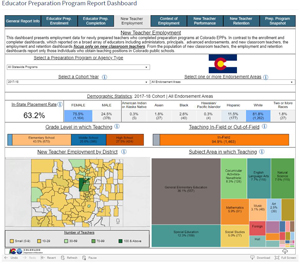
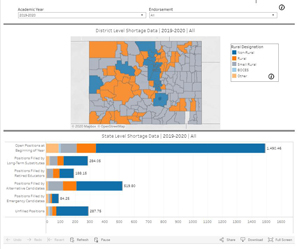
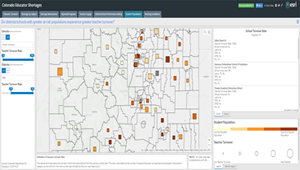
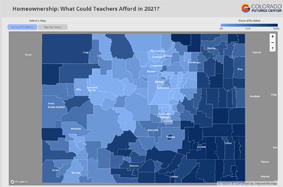
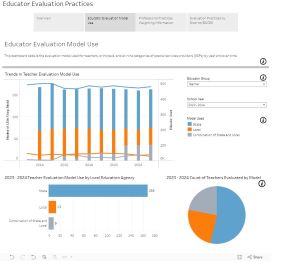
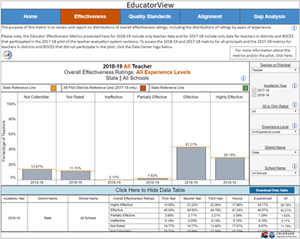

Connect With Us




